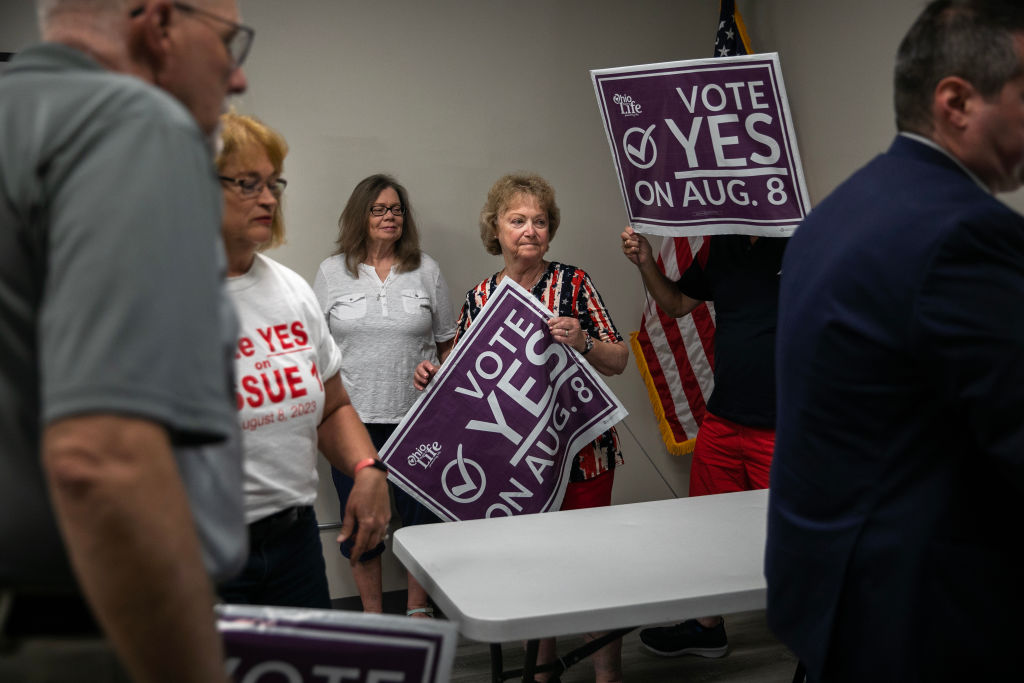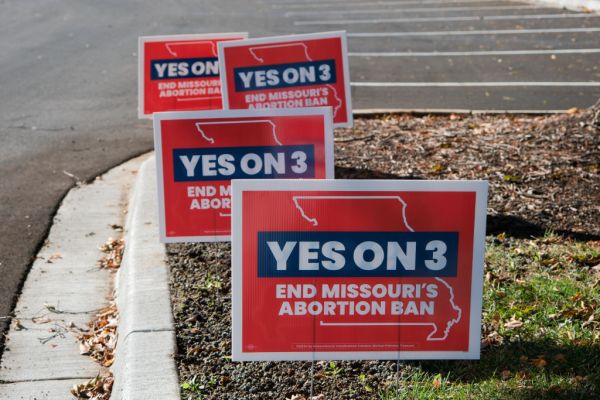Hello and happy Sunday. There was a pretty big news story close to the Ohio bureau recently that we should probably talk about. A beloved diner in our little suburb was featured on Guy Fieri’s Diners, Drive-Ins, and Dives, and it’s been the talk of the town. We’re all very happy for the folks at The Governor, but sad that we’ll have to wait in longer lines for their smoked brisket grilled cheese, Governor Tso’s chicken sandwiches, and lobster rolls. Oh wait, that’s probably not what you thought I was going to say.
I would be happy to talk about (confess to?) the fact that I have a soft-spot for the celebrity chef and Food Network fixture despite his frosted tips and trash-can nachos. Fieri’s enthusiasm is contagious, and his shows have helped hundreds of small restaurants enjoy critical and financial success.
And there’s nothing I’d rather discuss less than the actual big news story out of my home state. But I do think it offers some lessons for the parties going forward. And while I don’t want to get into too much punditry or legal analysis—we covered that in The Morning Dispatch, Dispatch Politics, and Boiling Frogs, I can share my perceptions of the campaign as it was run in Ohio.
On Tuesday, as you likely know, we had a special election to decide whether to raise the threshold for ballot measures to amend the state constitution. As it stands, such a measure needs only a simple majority to pass. The proposal we voted on last week would have increased that threshold to 60 percent, and it would have required that petitioners get signatures from all 88 Ohio counties to get on the ballot in the first place.
It’s easy to make the case for such a measure. Amending the Constitution is a bit more serious than passing a law, so we shouldn’t do it willy-nilly. We don’t amend the U.S. Constitution with the support of 26 states, right? You’ve gotta get 35.
But that’s not the debate we had here. And that’s because pro-choice groups had already successfully campaigned to get a ballot measure approved for November that, if passed, would make abortion a constitutional right up to the point of viability. The special election was, quite simply, an attempt to make its passage harder.
Based on the admittedly anecdotal evidence I collected during the campaign—yard signs, campaign literature, and my friends’ social media posts—I had an inkling of how it was going to go before Tuesday. But the minute I walked into my polling location, I knew. Working from home affords me the opportunity to vote at off-peak times, and I don’t think I’ve ever had to wait more than 10 minutes—even in a presidential election year. I didn’t have to wait this time, but the polling place was as busy as I’d ever seen it during a big primary or an off-year general election. It was August, there was one issue on the ballot, and people still turned out. It was going down.
It did, 57-43, and my observations about voter participation bore out: About 3 million people turned out to vote. (By comparison, 4.2 million people voted in the 2022 midterms and gubernatorial election. An August special election we had last year saw about 638,000 people turn out.)
What’s frustrating is that we clearly have a politically engaged populace, and we were subjected to a campaign full of fearmongering and deception by both sides. The left argued that the measure was antithetical to democracy itself and that Ohioans would be subject to minority rule if Issue 1 passed. (See my above comment on amending the U.S. Constitution.) The right raised the specter that the November ballot measure would strip parental rights—on abortion, but also gender-transition treatment. (Those concerns seem overblown, but do hit all the right culture-war buttons.)
The Ohio GOP did its best “Sideshow Bob stepping on rakes in The Simpsons” impersonation here. The side that’s supposed to be for fiscal responsibility spent $20 million in taxpayer money to conduct the kind of election that Ohio’s Republican secretary of state, Frank La Rose, argued just last year that we shouldn’t have, because “just a handful of voters end up making big decisions. … This isn’t how democracy is supposed to work.” And it lost.
I want to come back to the turnout for a minute. Deceptive campaign tactics have been the norm for most of my life. The last decade has been atrocious for our discourse, as we all know. (And there’s plenty of blame to go around: cable news and social media and extreme candidates on both sides.) And yet people are still engaged. That’s an encouraging sign. What’s discouraging is that they are often motivated by their animus toward the other side, not by good arguments for the matter at hand. What if politicians responded to that engagement by running campaigns for or against issues based on the merits, not indulging in shenanigans? Wishful thinking, I know.
Thanks for reading and enjoy your weekend.
Everyone knows the situation is awful for local news: A Northwestern University report estimates that 2,500 local papers have closed, largely because of the decline of advertising. And we have a pretty good idea about how it’s contributed to our political discourse: The lack of local news makes people focus on national news, and they’re often getting it from partisan sources (and fighting about it on social media). Happily, some people are trying to fix that. Report for America is a nonprofit established in 2017 that “recruits journalists and places them in struggling local newsrooms across the country,” Grayson notes, a la Teach for America. In the last five years it has placed 600 journalists at more than 300 publications around the country. There’s also the American Journalism Project, a group that raises money and distributes grants to newspapers to boost their business operations. Grayson talks to newspaper owners who’ve worked with Report for America and details how the papers—and their communities—have benefited.
Our opinion writers have sometimes referred to Donald Trump as a coup-plotter, and I’ve seen comments indicating that some readers are irked by the description. But as this op-ed from Kevin Carroll illustrates, those who think the phrase applies only to Trump’s behavior on January 6, 2021, are missing the big picture—and that picture is haunting. Two passages in particular from special counsel Jack Smith’s indictment of Donald Trump stood out to Carroll: Assistant Attorney General Jeffery Clark’s suggestion that Trump could invoke the Insurrection Act if he refused to relinquish power and violence broke out, and outside counsel John Eastman’s statement that “there had previously been points in the nation’s history where violence was necessary to protect the republic.” As Carroll writes: “The presidential demand anticipated by Clark and Eastman would place military leaders in [an] excruciating position … Generals would be forced to choose whether to abandon an unbroken tradition of American military obedience to civilian control, or turn their guns on civilians to facilitate a losing candidate remaining in the White House beyond Inauguration Day.”
In Wanderland (🔒), Kevin attempts to unravel the Gordian knot of Donald Trump’s legal and political issues. He looks in particular at the charges around Trump’s efforts to overturn the 2020 election. He notes that Trump’s counsel has suggested they will make a First Amendment defense—and that it’s uncertain that a jury will convict him. “The law may not be able to punish Trump for simple lies, or even for weaponized lies, but that doesn’t mean that we, as a republic, are powerless to act—if we choose to act.” He turns his ire toward the GOP candidates who are running against Trump without attacking him, toward sycophants like Ted Cruz and Sean Hannity, and toward Republican voters themselves. “Sycophant is an ugly word, but it isn’t ugly enough for Republicans in 2024,” he writes. “The judgment on Trump is, necessarily, a judgment on the Republican Party as a whole, on those who adhere to it, those who make excuses for it, those who cannot bring themselves to call it what it is.”
In Boiling Frogs (🔒), Nick offers up his take on the Ohio special election. “The Ohio GOP played Calvinball, in other words, aiming to change the rules in the middle of the proverbial game to produce an outcome it desired because it no longer believes it can persuade a majority to prefer that outcome on the merits.” Voters saw through it, and Nick notes that there are broader implications nationwide. “Republicans lost badly; they handed Democrats a morale booster in a year that’s been full of them at the polls; and they showed the national pro-choice majority that they’re willing to change the rules on the fly to try to entrench the minority’s favored policy.”
Here’s the best of the rest:
- Will Donald Trump the candidate say or do something that affects the trial of Donald Trump the defendant? How will the prosecution handle the thorny matter of Trump campaigning against a potential witness in his trial? Should Trump have a special room set up at Mar-a-Lago to review classified documents in that case against him? How is it that we are even asking these questions? Sarah and Mike Warren have answers (well, not for the last one, that’s all me) in The Collision.
- How has Trump maintained such a hold over his base? Because they don’t like the Republican Party any more than they like the Democratic Party. David Drucker writes about what he calls an “underappreciated dynamic” and looks at what it means for the future of the GOP.
- Italy joined China’s Belt and Road Initiative—nominally a massive infrastructure project to connect Asia to Europe, Africa, and Latin America, but one that is largely seen as an attempt to build soft power—four years ago. And now Italy wants out. Charlotte explains what is going on, and reports on other European efforts to pivot away from China.
- Charter schools are funded with taxpayer money, so how is a Catholic charter school about to open in Oklahoma? Audrey Baker explains.
- Pods! Pods! Pods! On The Remnant, Jonah has a wonky (in the best way) conversation with AEI senior fellow Ian Rowe on policies that can help build strong families. It’s an action-packed Advisory Opinions as Sarah and David discuss Trump’s court battles, ghost guns and the Supreme Court, voting rights for felons, and more. And on The Dispatch Podcast, the gang talks about the Ohio election and yet another Ron DeSantis reset.









Please note that we at The Dispatch hold ourselves, our work, and our commenters to a higher standard than other places on the internet. We welcome comments that foster genuine debate or discussion—including comments critical of us or our work—but responses that include ad hominem attacks on fellow Dispatch members or are intended to stoke fear and anger may be moderated.
You are currently using a limited time guest pass and do not have access to commenting. Consider subscribing to join the conversation.
With your membership, you only have the ability to comment on The Morning Dispatch articles. Consider upgrading to join the conversation everywhere.